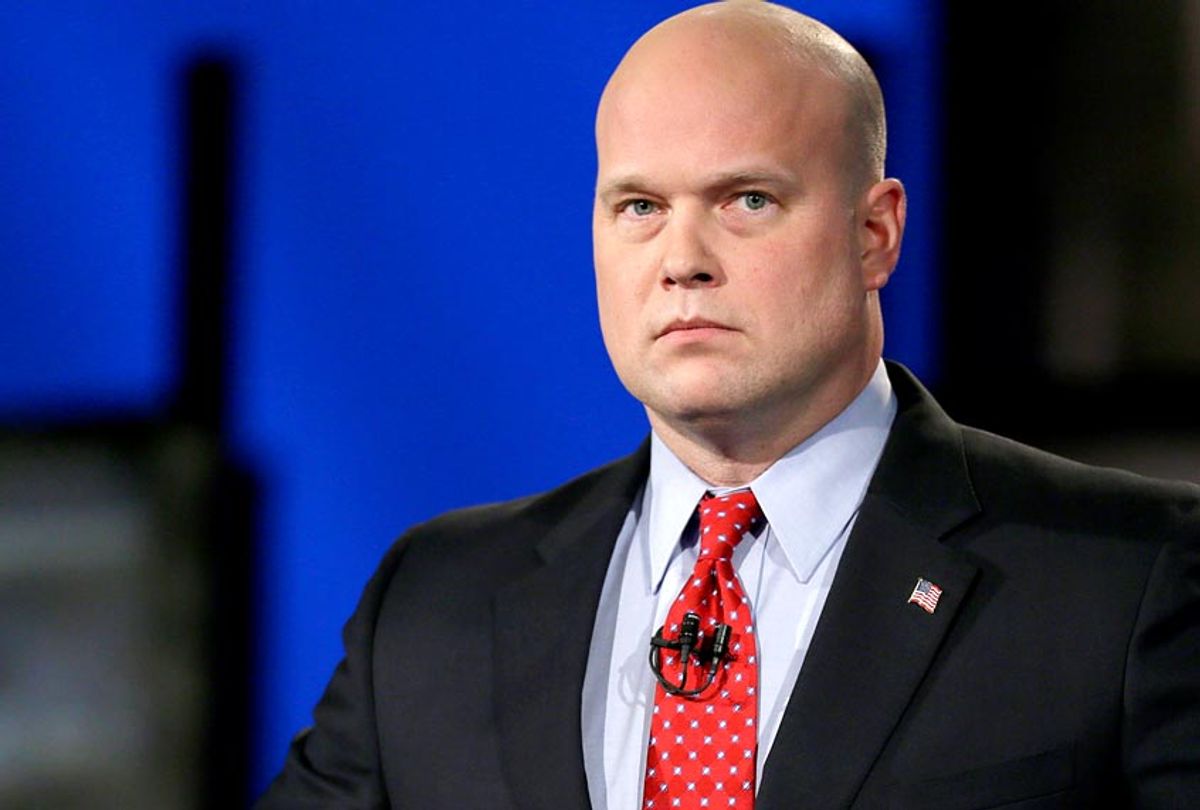President Donald Trump's choice for acting attorney general, Matthew Whitaker, is becoming more and more suspect as each passing day sheds light on new revelations about his background.
Perhaps foremost among them is the recent revelation that Whitaker received more than $1.2 million from a charity called the Foundation for Accountability and Civic Trust in the three years after he arrived in Washington in 2014, according to The Washington Post. Although Whitaker frequently used his status with FACT to appear on television and radio programs and denounce liberals, it is unclear what if anything the supposed nonprofit actually did. As the Post reported:
But FACT’s origins and the source of funding used to pay Whitaker — now the acting attorney general — remain obscured. An examination of state and federal records, and interviews with those involved, show that the group is part of a national network of nonprofits that often work in concert to amplify conservative messages.
Contrary to its claims in news releases and a tax filing, the group was created under a different name two years before Whitaker’s arrival, according to incorporation and IRS records. At least two of the organizers were involved in another conservative charity using the same address.
In its application to the IRS for status as a tax-exempt organization, the organizers reported that the group would study the impact of environmental regulations on businesses, records show. In that incarnation, the group took no action and “only existed on paper,” one man named in IRS filings as a board member told The Washington Post. Another named in a state filing as a board member said he never agreed to be on the board.
Since Whitaker's appointment, more attention has also been paid to his role in handing out unusually stiff sentences to drug offenders during his time as U. S. attorney, according to The Washington Post. On one notable occasion, he threatened a life sentence to a woman who was found guilty of possessing marijuana and delivering 12 grams of methamphetamine, compelling her to accept a plea bargain sentence of 21 to 27 years. Whitaker's draconian actions against drug offenders have drawn attention because his predecessor, Attorney General Jeff Sessions, had similarly far right views on individuals convicted of drug-related crimes.
In addition, Whitaker has aroused concern because of his past statement that judges should have a "biblical view" of the law, for repeatedly defending Trump about the Trump-Russia scandal and attacking special counsel Robert Mueller's investigation, and for demonstrating bias against Hillary Clinton such as in this USA Today editorial from 2016 disagreeing with the FBI's decision not to prosecute her.
A reasonable prosecutor may ask, if on numerous occasions, an unknown State Department employee had taken top secret information from a secured system, emailed that information on a Gmail account, and stored the information on a personal server for years, would that individual be prosecuted? I believe they would.
Judge Andrew Napolitano, a Fox News personality with libertarian leanings and a longstanding friendship with President Donald Trump, has also criticized Whitaker's appointment on the grounds that it's unconstitutional.
"Any judicial mind examining the circumstances of Mr. Whitaker’s appointment would find that it is not lawful because it does not comply with the specific statute, which requires that whoever runs the DOJ — I’m not talking about any other department, but the DOJ — must have been nominated by the President, confirmed by the Senate at the time they are elevated," Napolitano told Salon last week. "The reason for that is because of the extraordinary authority vested in whoever runs the DOJ. You might say, 'Well, the Secretary of Defense has extraordinary authority, he kills people.' Yes, he does, but he can’t fire a shot without the President’s permission. The Attorney General does not need the President’s permission to commence a criminal investigation, to direct the FBI, or to shut down a criminal investigation. For that reason, Congress required the Senate confirmation because Congress wants to know the legal thinking of the human being who’s going to run the DOJ. It’s too much power, Congress wrote — not I — to put in the hands of an untested, unexamined person, which is what Mr. Whitaker is. By untested and unexamined, I mean untested and unexamined by the rigors of the Senate."



Shares